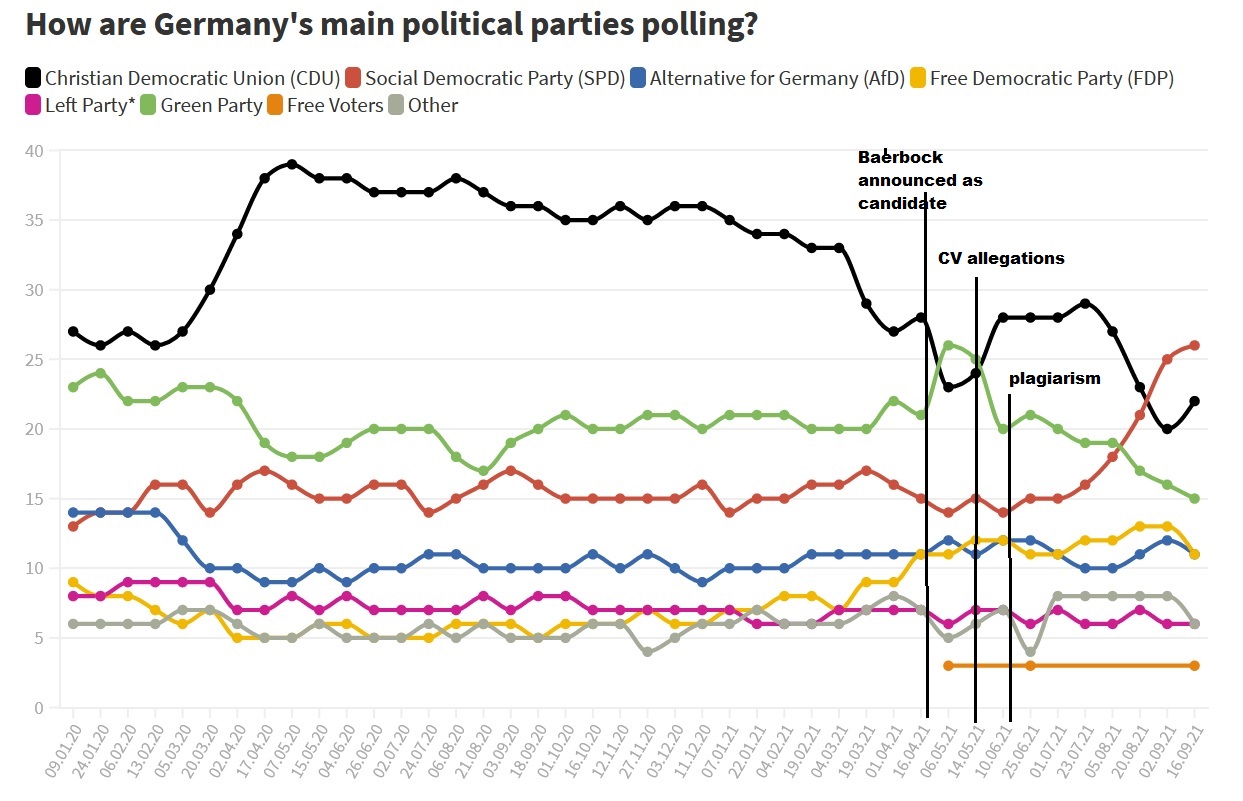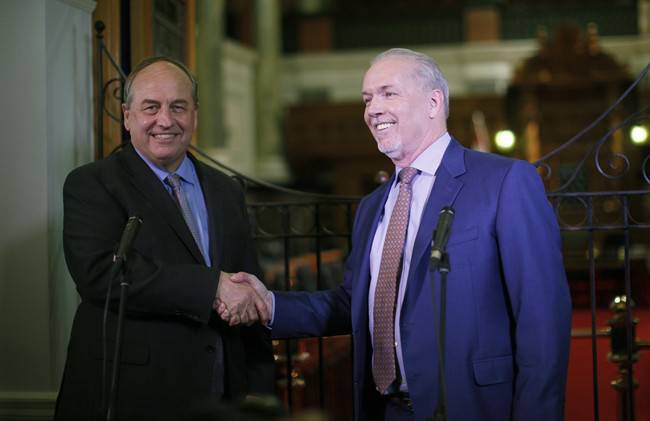Russia has been using social media, spyware and fake news to destroy the chances of the Green Party’s candidate winning Chancellorship ahead of tomorrow’s general election.
Baerbock: Green candidate is the number one target for disinformation campaign – Avaaz survey Sept 6

German Greens are headed for a record number of MPs in the General Election tomorrow (26 September), making it very likely they will form part of a German Government.
But the poll lead of the Green’s candidate for Chancellor – Annalena Baerbock – appears to have been destroyed by concerted online social media attacks many of which are believed to originate from Putin’s Kremlin.
The Kremlin is desperate to avoid a Green-led government that would be hostile to its pipeline project supplying Russian gas to Germany.
Baerbock has made clear her opposition to the pipeline since it makes the country more dependent both on Putin and on fossil fuel which will worsen the climate crisis.
Bloomberg reported in July: “Her opposition to completing the Nord Stream 2 gas pipeline between Germany and Russia is a particular concern. One person close to the Russian government said it would be prepared to go to great lengths to block her path to office.”
“One person close to the Russian government said it would be prepared to go to great lengths to block her path to office.”
Bloomberg news 28 July 2021
Both the other candidates for Chancellor – from the SPD (equivalent to UK’s Labour) and the CDU (Conservative) – have been accepting of the gas pipeline.
The Greens have reported to German security services an increase in cyber attacks that use Russian tactics well known to the US. Apparently party workers have been receiving large numbers of emails with a friendly greeting apparently from a contact that seek to install spyware on the internal Green Party system.
Baerbock herself has been targeted by false news stories and smears on social media.
In June, Bloomberg says, the US sent their top expert on election meddling Shelby Pierson of the Office of the Director of National Intelligence, to Berlin.
On September 6, the civil liberties group Avaaz also revealed that Baerbock has been bombarded with fake news more than any other candidate. It identified 84 fake narratives attacking German politicians and found that the vast majority – 71% – were aimed at Baerbock (see chart at top of this article).
Avaaz also showed that the AfD is receiving massive support via Facebook posts. “In 2021, the AfD will account for 64% of all interactions from party and parliamentary groups. At the other end of the spectrum, the Greens had only 0.3 million interactions over the same period. In other words: The AfD pages achieve 25 times more interactions on Facebook than those of the Greens.” Back in 2019 a study by the George Washington University concluded that in the run up to the Euro elections the “thousands of dubious Facebook accounts, the authenticity of which is doubtful, advertise the AfD”. Many of them are from outside Germany, the study said. Avaaz says the same happened again from October 2020 in the run up to tomorrow’s general election, with a huge spike in pro AfD Facebook posts this spring.
“Thousands of dubious Facebook accounts, the authenticity of which is doubtful, advertise the AfD”.
George washington institute report 2019
Shortly after the Greens announced Baerbock’s candidacy, on April 19th, posts appeared online claiming falsely that Baerbock wanted to ban children from having pets at home. Despite the party denouncing them as fake, officials were still getting asked about them months later as far right and other social media posters kept them alive.
Over half of all voters in Germany have come across at least one falsehood about Baerbock, according to the Avaaz survey.
On September 3rd online news outlet Politico reported that Kremlin financed TV station RT Deutsch was pursuing a twin strategy of promoting AfD while attacking the Green Party and Baerbock.
Politico said: “They also make routine references to both the CDU and SPD political parties, but mostly leave these groups alone in terms of promotion or attacking their polices…In a recent plagiarism scandal involving the German politician, the Russian outlet produced a series of articles that provided blow-by-blow details of Baerbock’s alleged wrongdoing.”
“Facebook, Twitter and google don’t have a good track record of dealing with non English language misinformation”
Mark Scott, digital writer for Politico 24 june 2021
Worryingly, on June 24th, Politico’s digital writer Mark Scott warned that the global social media giants were woefully unprepared for online misinformation inteference in the election. “Facebook, Twitter and Google don’t have a good track record of dealing with non-English language misinformation,” he said. “The companies are only now rolling out their election game plans in Germany. Yet after I did a search for #Wahlfälschung, or election fraud, on both Facebook and Twitter, I quickly found myself in a rabbit hole of false claims, conspiracy theories and politically-motivated hate speech.”
In September, another think tank, the Institute for Strategic Dialogue, backed up these findings publishing a survey that found that Baerbock was subject to more conspiracy theories and disinformation than Social Democrat candidate Olaf Scholz and Christian Democrat candidate Armin Laschet. She was also the recipient of sexist attacks that the other candidates, both men, did not receive.
Not all these attacks can be directly linked to Russian sources and some of the sexist attacks and support for AfD’s anti-immigration stance is likely to be magnified by a sexist and racist attitude from a minority of German people. All three candidates have had stumbles and scandals and Baerbock’s seem small in comparison to Scholz’s failure as head of the country’s financial regulator to prevent major financial fraud at Wirecard for example. Yet both now have a neck and neck lead while the Greens are now polling lower than they have since at least the start of 2020.

There can be no doubt that a concerted Kremlin campaign has seriously hit the polling position of the Green Party in the months since Baerbock’s candidacy was announced, helping amplify some of her relatively minor mistakes and preventing her from achieving the Chancellorship.
The Greens are still likely to play a big part in the next Government, so Putin hasn’t had it all his way, but they look like being a junior partner to the CDU or SPD, or both.
EU and UK regulators need to toughen up regulation of online news urgently, or Putin will keep interfering with democracy.








 lowness of flavour overlies a deeper honeyed nuttiness, crisply sweet not sugar sweet, but the succulence of a well devilled marrow bone. Surely no apple of greater distinction or more perfect balance can ever have been raised anywhere on earth.” Art critic and pomologist Philip Morton Shand (right), BBC Radio 1944.
lowness of flavour overlies a deeper honeyed nuttiness, crisply sweet not sugar sweet, but the succulence of a well devilled marrow bone. Surely no apple of greater distinction or more perfect balance can ever have been raised anywhere on earth.” Art critic and pomologist Philip Morton Shand (right), BBC Radio 1944.





